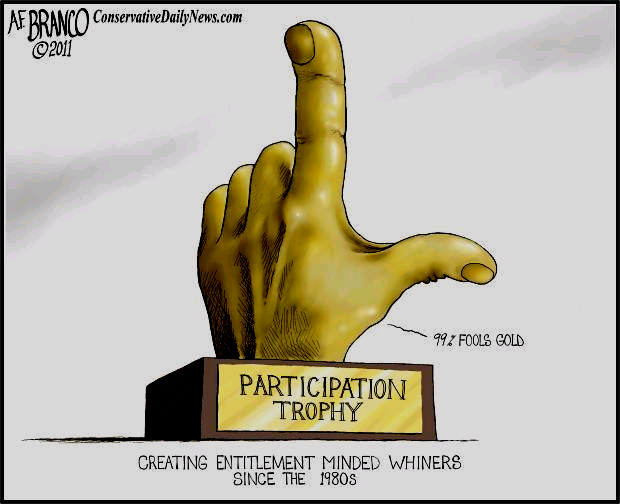Best Be Slightly Behind
It seems like competition has gotten a bad rap these days. We've gone away from keeping score. We've introduced mercy rules. High schools don't give out awards for the top male and female athletes of the year. We don't hand out finishers medals but instead everyone gets a participation medal.
Are we going in the right direction? Is this helping us as a society?
I'd argue that it's not. And here's why.
I guess we eliminate acknowledging the best athletes at the end of the year because there can only be one winner. And therefore to protect the feelings of those who don't win we just do away with the award altogether.
I'd suggest that this fails on two levels. First, the best athlete is robbed of the award they worked hard to achieve. Secondly, the athletes that don't win don't feel they are equal to the one that should have won. Instead I'd suggest the ones that don't win feel worse because now we're also hoping they'll buy into the idea that all the athletes are equal. So not only do they not have the same athletic ability but we're also hoping they're dumb enough to believe it.
Life is not fair. And because two athletes aren't equal has nothing to do with value.
When we play this game we set young athletes up for a rude awakening. They will be surprised when they aren't selected for an interview. They will be incredulous they weren't hired for the job. And they won't understand why they were passed up for the promotion.
Business tycoon Jimmy Pattison is said to have fired the lowest performing sales person at his car dealerships. Some people would consider this harsh. Or is he being fair and honest with these people? Would it be better to keep someone in a job they don't have the aptitude and drive to succeed? Or would it be better to release them from the position and let them get on with whatever they will be successful in life sooner?
What does the research have to say on the topic?
Is there any proof in the literature that competition can be a good thing? And why it might be a good thing to keep score and know how close you are to the winner?
A 2009 study looked at over 60,000 basketball games played in the NCAA and NBA (1). What they found that being slightly behind at half-time, 2 and 6 points for these leagues, was an advantage when it came to winning.
In the NHL the same trend holds true. Teams that are up one goal after the first period go on to win only 33% percent of games.

What about testing our own limits? Will we achieve more when we believe we are in competition?
The answer is yes.
In a 2017 study researchers had cyclists perform a 4000 m time trial (2). This is an all-out effort to complete the time trial in the least time possible. If you'd like to see this demonstrated just ask Axel Merckx and he'd be happy to jump on a bike and show you.
After the time trial the researchers had the cyclists repeat the time trial. This time however there was an avatar for the cyclists to follow. The cyclists were told the pace of the avatar represented their best times from the previous effort. The truth is the avatar was set at a 2-5% higher power output than their previous best. The cyclists were able to keep pace with their avatar and thus improve their performance.
So what does this all mean?
Well basically that competition can be a good thing. It can challenge us to do more and bring out the best in us. Maybe there is too much of an emphasis on winning. And if you're not winning that this is the worst thing in the world. So we create scenarios where there are no winners and losers to protect fragile egos.
Instead I'd rather see a world with fair competition. I'd rather play my best against a much better opponent, and almost win, than play poorly and beat a weak adversary. At the end of the day hopefully it comes down to win or learn. Because if we aren't keeping score, if we aren't competing and if we aren't learning than we aren't getting better.
What do you think?
Did this post rub you the wrong way? Let me know if the comments section below.
References
- Berger, J. A., & Pope, D. (2011). Can Losing Lead to Winning? Marketing Science. 57(5), 817-827.http://dx.doi.org/10.1287/ mnsc.1110.1328.
- Stone M.R., Thomas K., Wilkinson M., Stevenson E., Gibson A.S.C., Jones A.M., Thompson A.M. 2017. Exploring the performance reserve: Effect of different magnitudes of power output deception on 4,000 m cycling time-trial performance. PLos One. 12(3): e0173120.
When you subscribe to the blog, we will send you an e-mail when there are new updates on the site so you wouldn't miss them.

Comments